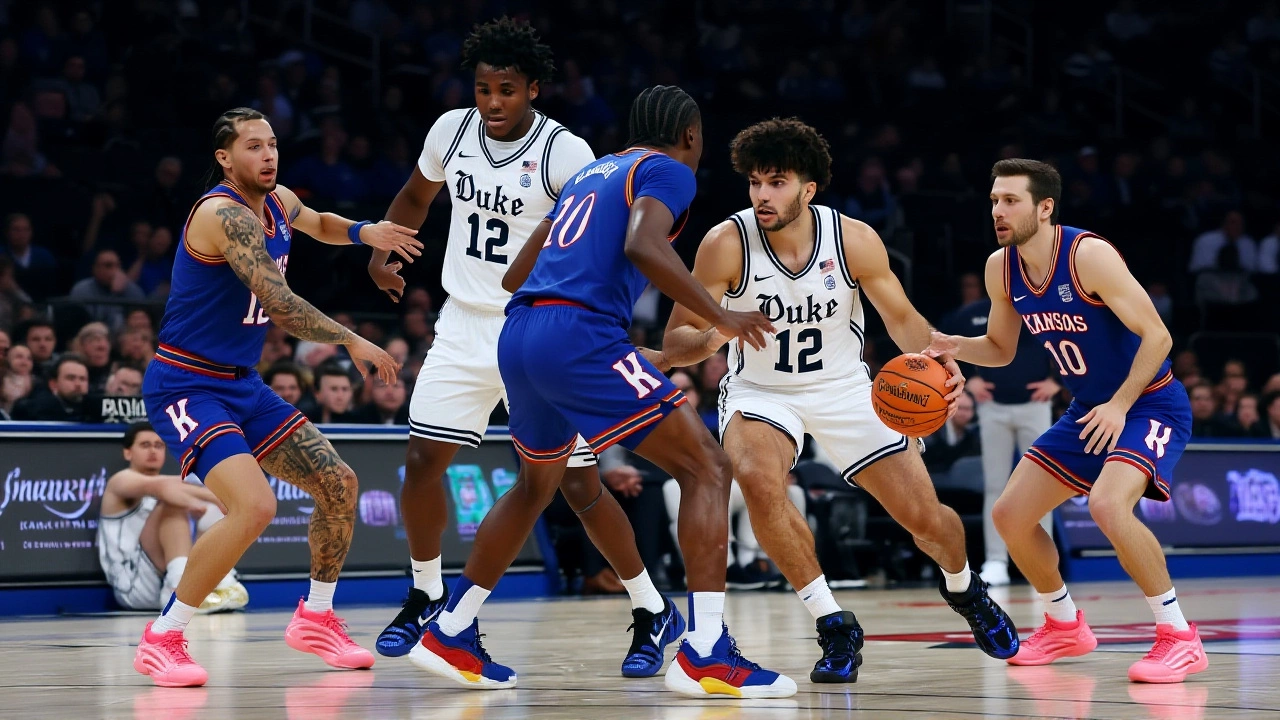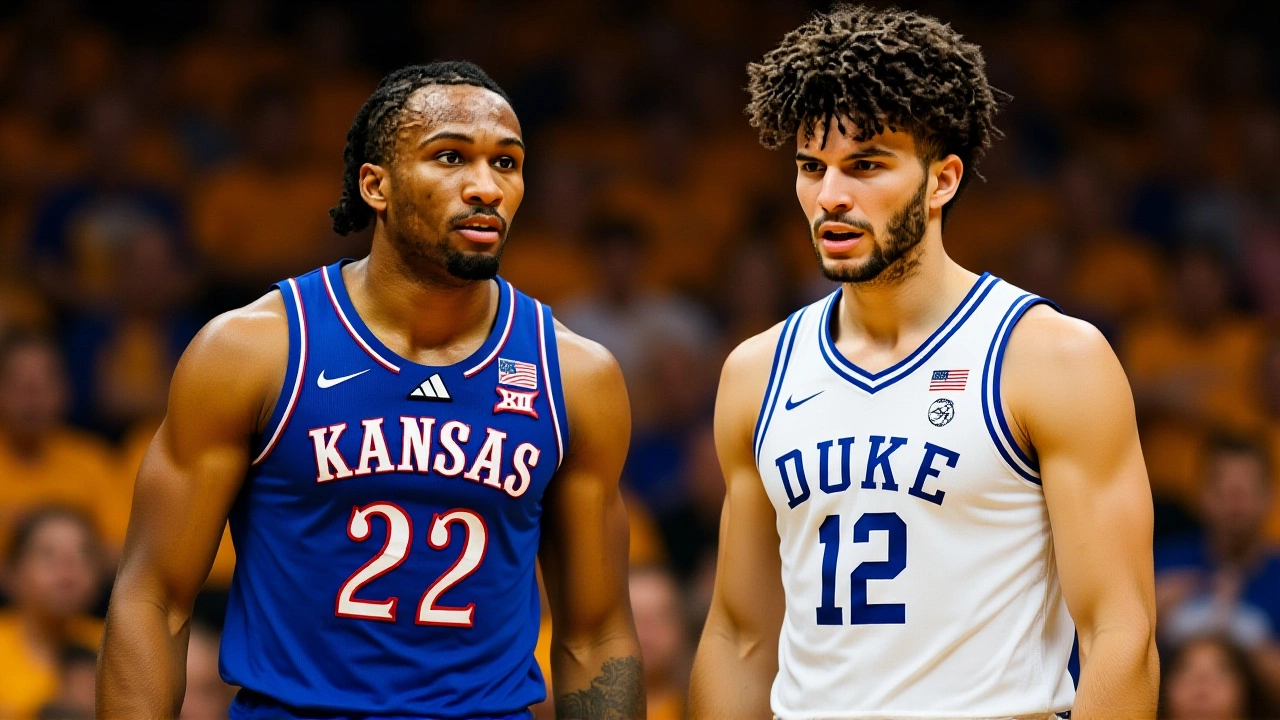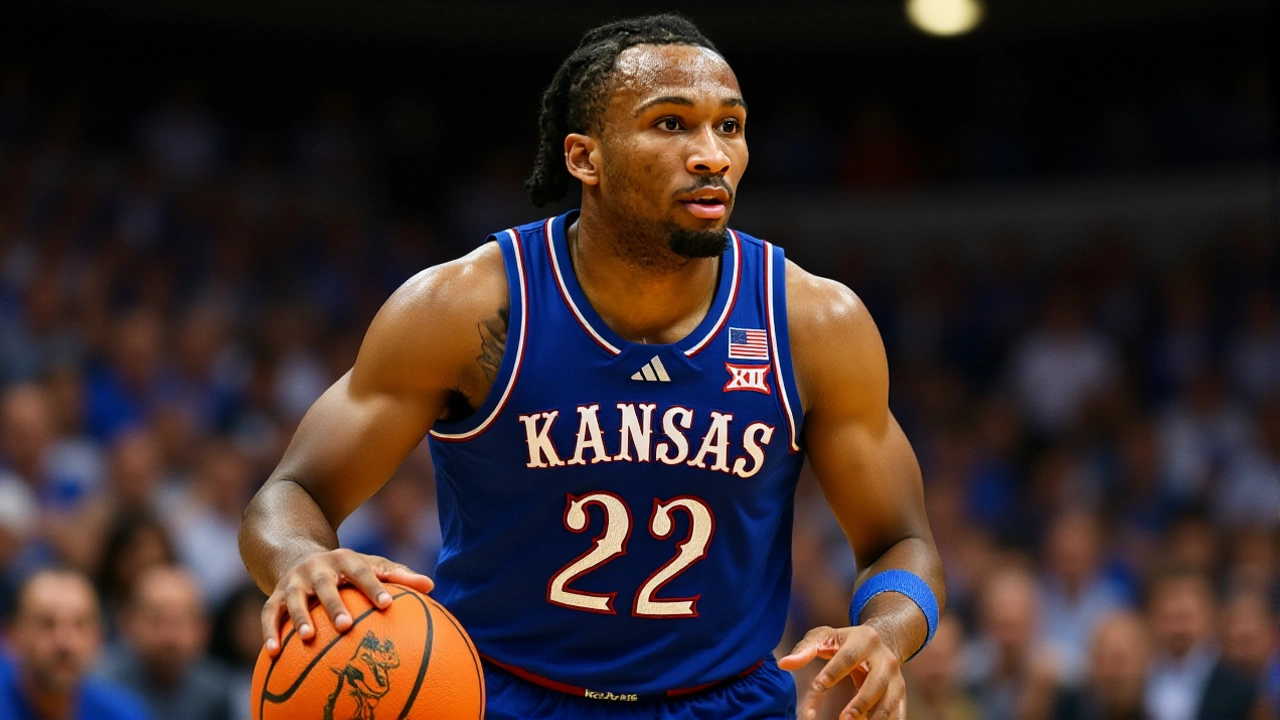
When Cameron Boozer grabbed his 10th rebound with 3:12 left in the second half, the crowd at Madison Square Garden erupted—not just for the stat, but for what it represented: a freshman announcing himself on college basketball’s biggest stage. Boozer finished with 18 points, 10 rebounds, and 5 assists, leading the Duke Blue Devils to a 78-66 victory over the Kansas Jayhawks in the Champions ClassicNew York City on Tuesday, November 18, 2025. It wasn’t just a win. It was a statement. Duke, now 5-0, had just toppled a top-25 rival on neutral ground for the first time this season, and they did it with poise, depth, and a breakout performance that had fans buzzing before the final buzzer.
Boozer’s Breakout and Evans’ Clutch Shooting
The game was tight through the first half, with Kansas holding a slim 34-33 lead thanks to a career-night from sophomore center Flory Bidunga, who dropped 25 points on 10-of-11 shooting in their previous game against Princeton. But Duke adjusted. Isaiah Evans, the sophomore guard, took over late in the second half. His three-pointer with just two seconds left on the shot clock—followed by a full-court pass from Boozer to Evans for a layup—became the defining sequence of the night, according to Duke fan forums. That play didn’t just extend the lead; it broke Kansas’ spirit.Boozer’s all-around game was the story. At 6’8”, with the agility of a guard and the strength of a veteran big man, he didn’t just score—he orchestrated. His five assists weren’t flashy dimes; they were smart, timely passes that exploited Kansas’ overhelping defense. His 10 rebounds included four on the offensive glass, sparking crucial second-chance points. And he did it all while playing 34 minutes against a physically imposing front line.
Coaches’ Perspectives: Scheyer’s System vs. Self’s Resilience
Before tip-off, Jon Scheyer, Duke’s head coach since 2022, called it “a big-time game we’ll be ready for.” He wasn’t wrong. Scheyer’s nine-man rotation kept players fresh, especially in the second half when Kansas started to fatigue. Freshman guard Caleb Foster had his most complete half of the season, hitting key mid-range jumpers and playing lockdown defense on Kansas’ perimeter threats.Meanwhile, Bill Self, the veteran Kansas coach who’s led the program since 2003, called it “a big boy game.” He acknowledged Duke’s improved execution but downplayed comparisons to last year’s team. “It’s too early to tell,” Self said. “But right now, they’re executing better than last year.”
What Self didn’t say—though fans and analysts noticed—was that Kansas played without its star player. Multiple forum posters speculated it was guard Jalen Wilson, who missed the game with a lingering ankle injury. “We played very OK,” one fan wrote. “And a handful of Kansas guys played some of the best basketball of their lives… and we STILL won comfortably.” That’s not just resilience—it’s a testament to Self’s culture.

Historical Context: Duke’s Redemption Arc
This wasn’t just another early-season win. It was payback. Kansas had won five of the last six meetings with Duke, including a 75-68 thriller in Las Vegas last December. That loss haunted Duke’s locker room all offseason. “We talked about it every day in film session,” said sophomore forward Cayden Boozer, Cameron’s brother and a key rotation piece off the bench. “They beat us when we thought we were better. This time? We didn’t let them breathe.”The Champions Classic, which began in 2011, has long been a barometer for national title contenders. Duke and Kansas are the only two programs to have appeared in every edition. This year’s matchup felt different—more urgent. With Kentucky and Michigan State also in the field, the early-season stakes were higher than ever. Duke’s win didn’t just improve their record; it reestablished them as a true national power in a year where the top of the polls is wide open.
What’s Next for Both Teams?
Duke’s schedule doesn’t ease up. After this win, they’ll face a home game against North Carolina on November 26, followed by a tough road test at Virginia Tech on December 3. Their depth, particularly with the Boozer brothers and Evans emerging as a scoring trio, suggests they can compete with anyone.Kansas, now 3-2, heads into a brutal stretch: three neutral-site games in eight days, including matchups with Notre Dame and Syracuse. Without their star, they’ll need Bidunga to maintain his elite efficiency and role players like White and Tiller to step up. Self knows this stretch will define his team’s season.

Why This Matters
College basketball’s season is long, but November games like this set the tone. Duke’s win wasn’t just about beating a ranked team—it was about proving they’ve evolved. Scheyer’s system is working. The freshmen aren’t just playing; they’re leading. And for the first time since Mike Krzyzewski’s retirement, Duke isn’t just rebuilding—they’re reloading.Kansas, meanwhile, showed heart. But without their star, they’re vulnerable. If they can’t find consistent scoring beyond Bidunga, their Final Four hopes may stall before conference play even begins.
Frequently Asked Questions
How did Cameron Boozer’s performance compare to other Duke freshmen in recent history?
Cameron Boozer’s 18-point, 10-rebound, 5-assist line is the first triple-double by a Duke freshman since Zion Williamson in 2019. Only two other freshmen in the last 15 years have posted similar stats in a Champions Classic game: Jayson Tatum (2016) and Paolo Banchero (2021). Boozer’s efficiency—18 points on 14 shots—suggests he’s more polished than either.
Why is the Champions Classic so important for Duke and Kansas?
The Champions Classic is a showcase for blue-blood programs, held at iconic venues like Madison Square Garden and the United Center. For Duke and Kansas, it’s not just about rankings—it’s about legacy. Winning here signals national relevance, attracts top recruits, and often predicts March success. Both teams have appeared in every edition since 2011, making this one of college basketball’s most storied rivalries.
What impact did Kansas missing their star player have on the game?
While officially unconfirmed, multiple sources point to guard Jalen Wilson’s absence due to ankle injury. His scoring and playmaking were critical in Kansas’ earlier wins. Without him, their offense stalled in crunch time. Duke’s defense capitalized, forcing 15 turnovers—seven in the final 10 minutes. Kansas still played hard, but their margin for error vanished without their primary option.
Is Duke now a legitimate Final Four contender?
Absolutely. With Boozer, Evans, and Foster forming a dynamic trio, and Scheyer’s system emphasizing pace and spacing, Duke ranks top-10 nationally in offensive efficiency. Their defense still has gaps, but they’re rebounding better than last year. If they maintain this level through ACC play, they’re not just contenders—they’re favorites.
How does this win affect Duke’s recruiting?
Boozer’s breakout has already drawn attention from top 2026 recruits. Three five-star prospects told ESPN they’re now “re-evaluating” Duke after seeing how he thrived under Scheyer’s system. The Blue Devils’ ability to develop freshmen into NBA-caliber players—like last year’s No. 1 pick, Dereck Lively II—is becoming a major selling point.
What’s the historical significance of Duke beating Kansas at Madison Square Garden?
This was Duke’s first win over Kansas at MSG since 2013, snapping a three-game losing streak in the venue. The Garden has hosted 12 Champions Classic matchups, and only twice has Duke won both the game and the overall tournament crown. This victory gives them momentum heading into December’s Big Ten/ACC Challenge and reinforces their status as a perennial powerhouse.